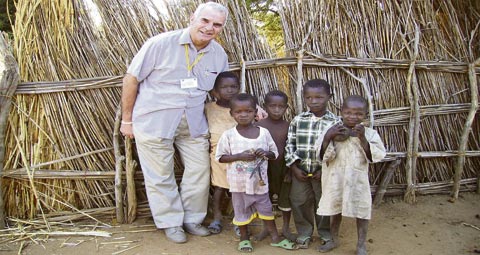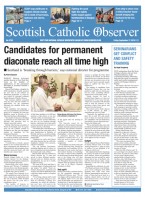BY Martin Dunlop | July 8 2011 | ![]() 0 COMMENTS
0 COMMENTS ![]() print
print

Pray for a peaceful future in Sudan
Publication Date: 2011-07-08
Cardinal Keith O’Brien issues call for prayers as South Sudan becomes the world’s newest nation
Cardinal Keith O’Brien and SCIAF have called for the Catholic community and all people of faith to dedicate their prayers to the peaceful future of Sudan as the south region prepares to split from the north this weekend.
The largely Christian South Sudan will become the world’s newest nation on Saturday, as its independence from the mainly Muslim north following decades of civil war is officially recognised.
January’s independence referendum in southern Sudan—at which more than 99 per cent of the population voted on secession from the north—signalled the culmination of the Comprehensive Peace Agreement of 2005, which brought an end to the war that started in 1983.
Peace call
Fighting, however, is still raging in the border area of South Kordofan and Cardinal O’Brien, chairman of the board of directors of SCIAF, emphasised the importance of a peaceful transition in the area.
“I know from my visit to Sudan with SCIAF that the war between the north and south, which lasted for 21 years and took the lives of 1.5 million people, has had a terrible impact on the population,” the cardinal said. “It is vital that there is a peaceful transition to independence for South Sudan and that the forces of the north and south agree to an immediate ceasefire in the border areas. Only with peace, can the long-suffering people of Sudan hope to develop their new relationships as neighbours. It is only when the violence stops that societies can really lift their people out of poverty.”
As a new beginning for the Republic of South Sudan draws ever closer, Cardinal O’Brien reaffirmed the need for prayer and his hopes that the people of the south and north of the country can live peaceful lives.
“I would call on the Catholic community and people of all faiths to pray that Sudan can leave its history of bloody violence behind and move on to a peaceful and prosperous future,” the cardinal said.
Displacements and conflict
SCIAF has been working with Caritas Internationalis, the global network of Catholic aid agencies, to support tens of thousands of South Sudanese returning to the region following the referendum.
A peaceful future for the area still appears in jeopardy, however, as fighting continued as the SCO went to press. Last month, more than 100,000 people were displaced from the oil-rich border region of Abyei when northern troops took control of the area, and a further 70,000 people are estimated to have been displaced in neighbouring South Kordofan.
Caritas Internationalis has warned that conflict in Sudan’s Nuba Mountains (in South Kordofan) and Abyei risks spiralling into a full-blown major humanitarian emergency and that all parties should agree to an immediate ceasefire and allow access to UN and international NGOs.
Mgr Roko Taban Mousa, Apostolic administrator of Malakai in southern Sudan, in whose jurisdiction Abyei is included, said ‘the situation of displaced people of Abyei remains dramatic, despite the arrival of some humanitarian aid.’
“Tens of thousands of people are still living in the open in the woods, under the incessant rain,” he said. “Food and medicines continue to be scarce. The situation of mothers is particularly dramatic, who have been forced to give birth along the roadside and infants are victims of malaria and dysentery.”
Struggle to rebuild
Following the vote for independence, the government of South Sudan called upon its citizens to return and rebuild their nation but most returnees have ended up homeless and some 390,000 Sudanese refugees are still living in camps or urban settings in neighbouring countries, in particular Egypt, Chad, Uganda, Kenya and Ethiopia.
The new Republic of South Sudan covers 400,000 square miles—an area larger than the UK and Germany combined—but the infrastructure is poor and there are only 19 miles of paved roads. Shortages of food, drinking water, sanitation and health care afflict the country, a situation that is proving highly problematic for charities such as SCIAF who are based in Juba, the new nation’s capital city, providing humanitarian assistance to some 100,000 people desperately in need of shelter, food and sanitation.
SCIAF has also worked with Radio Bakhita, a radio station set up by the Bishops’ Conference of Sudan in Juba to promote civic education and the peaceful resolution of conflict. But, as Isle Simma, head of the coordination unit for Caritas said, nobody could have ‘expected this big exodus out of the north.’
“It is a humanitarian crisis because in a country where you have low development standards and very scarce resources, it puts a lot of pressure on the host communities,” she said.











